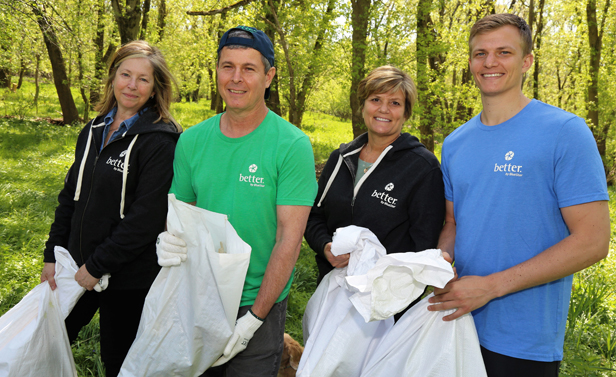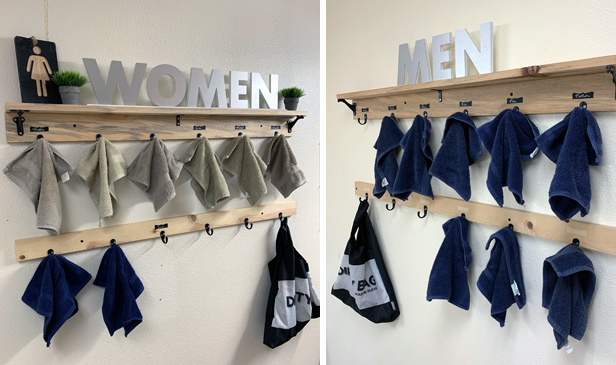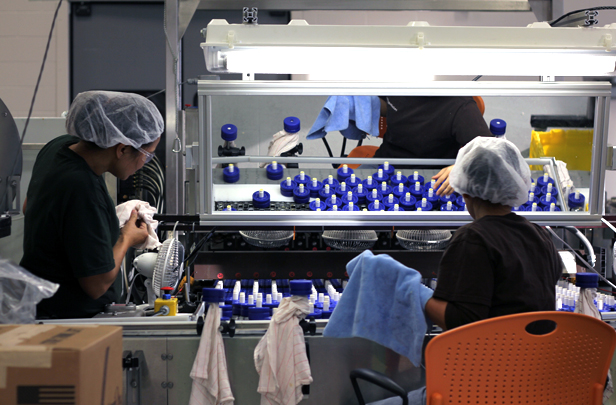Strategy July 06, 2022
A Single Letter Has Become the Gold Standard in Sustainability
More companies in promo and beyond have been touting their status as a B Corp. Demand for the rigorous sustainability certification is the highest it’s ever been.
When Danny Sheppard graduated from Dickinson College in 2017, he came home with more than just a bachelor’s in sociology. The private liberal arts college in Carlisle, PA, had instilled in him a keen awareness of his own environmental impact and a strong desire to be a force for positive change in the world.
The lessons he’d learned rubbed off on his dad as well. Soon enough, Hal Sheppard and his son were making significant lifestyle changes – planting a garden in the backyard, setting up a hydroponic tent inside for year-round fresh veggies, switching to an electric vehicle (in Hal’s case) or eschewing a car altogether in favor of public transportation (in Danny’s case).
“My dad and I just kind of both started realizing there’s a better way to live,” Danny recalls.
It wasn’t too long after that the pair had another thought: “Why can’t we do this with the business too?”

Employees at Better By Bluestar, (from left) Barb Hoffman, Hal Sheppard, Fran Sheppard and Danny Sheppard, participate in a creek cleanup as part of the eco-minded distributor’s giveback efforts.
Hal had launched Bluestar Marketing (asi/141977) back in the early 1990s after buying a four-head Tajima embroidery machine. He eventually sold the machine to a contract decorator, but held on to his love of selling promotional products and focused his efforts on the front-facing side of the Philadelphia area-based business.
When Danny officially joined the family business in 2019, the Sheppards refreshed the brand, changing the company name to “Better By Bluestar” and completely rethinking their ethos. “We decided let’s make a go of this, but not on the premise of just selling more product or doing this the same way that we’ve always done it,” Hal says. “It was with a sort of shared commitment, mission and passion for doing things better.”
In addition to educating clients about making more sustainable promo choices, the Sheppards had their distributorship certified as Climate Neutral, joined the Sustainable Business Network of Greater Philadelphia and became a member of 1% for the Planet, donating a portion of profits to Wissahickon Trails, a nonprofit that maintains trails and protects the local watershed.
But Better By Bluestar also went a step further, undertaking the arduous and soul-searching process of becoming a Certified B Corp – joining a small but growing contingent of promotional products suppliers and distributors to earn that distinction.
B Corps (the B stands for “benefit”) have in many ways become the gold standard for purpose-driven companies. Like with any sustainable certification, there are criticisms – namely that it relies too heavily on self-reporting and that its somewhat opaque scoring system could be a cover for greenwashing. Still, the designation has been generally heralded as a useful and meaningful framework for businesses seeking to pursue the triple bottom line of people, planet and profit. And it’s quickly becoming a defining mark of sustainability in promotional products.
“If you’re talking that talk,” Hal says, “you really have to back it up.”
What Is a B Corp?
With the idea that businesses can and should strive to make a positive impact on the world, the nonprofit B Lab started the B Corp movement in 2006 by prioritizing things like environmental action, fair and inclusive labor practices, and community involvement.
“B Corps fly in the face of Milton Friedman’s 50-year-old doctrine that the only responsibility of a corporation is to maximize shareholder profit,” says ASI Promo for the Planet advisory board member Andy Keller, CEO of ChicoBag (asi/44811), which became a B Corp in 2013. “[Certification] allows you to declare your purpose beyond making a profit. In my opinion, profit is simply permission to keep operating your business, and all business should have a greater purpose.”

ChicoBag, a B Corp for nearly a decade, sells reusable bags and utensils and strives to reduce waste in its Chico, CA office. The supplier sends just 30 pounds of trash to landfills each month, thanks to an aggressive recycling program. Employees pledge to avoid single-use products, and in the office bathroom, employees use individually assigned cloth hand towels, rather than paper ones.
Instead of shareholders, the B Corp movement asks corporate leaders to prioritize all stakeholders – customers, workers, vendors, communities and the environment – in decision-making, codifying it as a commitment into their corporate governance structure.
Companies seeking B Corp certification must complete an impact assessment based on the standards set up by the B Lab, documenting everything from their legal structure and supply chain practices to philanthropy, customer relations and employee engagement. Depending on a company’s industry, size and geography, the answers on the assessment are weighed differently, but in order to qualify for B Corp status, companies must achieve a score of 80 points or more. (The median score for ordinary businesses that complete the assessment is currently 50.9, according to B Lab.) Representatives from the B Lab will evaluate and verify the assessment before a company can be certified. In general, the process takes at least 12 months – and sometimes significantly longer – to complete.
“This isn’t a certification where you can just cut a check and receive a plaque for your office,” says Sam Singh, president and CEO of Full Line Specialties (asi/199688), a Surrey, BC-based distributor that became a B Corp in late 2021.
Once companies have been certified, they can’t rest on their laurels either. They must undergo a recertification process every three years to maintain their status as B Corps. And the assessment itself evolves as the B Lab takes into consideration current social and environmental issues.

Raining Rose, a B Corp since 2016, manufactures all-natural and organic body products from its sustainable LEED-certified facility in Cedar Rapids, IA.
“I think the beautiful challenge of being a B Corp is that it does get more difficult each year as more important things come to mind,” says Lindsey Davis, a member of the Promo for the Planet board and director of promotional sales at Cedar Rapids, IA-based Raining Rose (asi/80489), which became a Certified B Corporation in 2016. “It guides B Corps to be better as opposed to just being like, ‘Cool, I got an 80 last time. I’m going to get 120 this time.’”
Raining Rose is undergoing the recertification process this year, and Davis assumed that some of the initiatives it started in the three years since its previous go-round with B Lab would help jolt its impact assessment score higher. The supplier launched a giveback program called Honeybees and Humans, donating 1% of annual profits to support honeybees, along with supplies and training for beekeepers through Heifer International. It upcycles about 2,400 gallons of rinse water to a 2.8 megawatt anaerobic digester that turns cattle manure and factory byproduct into energy-generating methane gas for the local community. And it partnered with the nonprofit Catherine McAuley Center to start a free, on-site English tutoring program for employees who either don’t yet speak the language or are looking to improve their skills.
“Becoming a B Corp allows us to tell an authentic, third-party verified story about our impact in the world.” Andy Keller, ChicoBag
Those initiatives, worthy and important as they are, likely won’t be pushing Raining Rose’s B Impact score much higher than its previous assessment, but they’re enough to keep the supplier in line with what B Lab is currently looking for in a B Corp. “It’s great that we put all that in because we can still qualify,” Davis says.
Becoming a B Corp “should be considered a forever path,” adds Michelle Sheldon, another Promo for the Planet board member and president of Eco Promotional Products (asi/185797), a B Corp since June 2016. “If we simply tried to maintain, we would never achieve recertification. Our B Corp status means we continue to evolve and do better.”
Why Become a B Corp?
Considering how time-consuming and stringent the certification journey is, why would any company choose to go that route? There are many reasons, but in actuality, the thorough documentation and vetting process is precisely why the movement has been growing in popularity. Being able to put a B Corp label on a website and product is a mark of distinction, and helps set companies apart from the crowd; it has an air of credibility both with consumers and other brands a company might partner with.
“Everyone started ‘going green’ around 2008, and that started a tsunami of greenwashing,” Keller says. “Companies were making sustainability claims without backing them up with transparency through their supply chain. Becoming a B Corp allows us to rise above the riffraff to tell an authentic, third-party verified story about our impact in the world.”
Another selling point for the program is the holistic nature of the certification. Many other sustainability and social justice certification programs out there address specific issues, perhaps looking at whether a product is made using fair trade practices of whether a facility has achieved carbon neutral status. Those sorts of specialized certifications have value, of course, but many companies like the broader, umbrella approach of B Lab.
A B Corp certification “is one of the only credentials that is not for a product or service, but for the whole business behind the product or service,” says Kate Hallett, chief marketing officer at Harper + Scott (asi/220052), which became a B Corp in March 2020.
A tangible benefit of the certification is access to the so-called B Hive – a platform where members of the B Corp community can connect, collaborate and share knowledge and best practices. It can also be a fruitful networking tool – sometimes drumming up new business from like-minded clients.
Through its Workforce Development team, Doing Good Works hires young adults who have been through foster care to work on their kitting teams. The distributor has started adding QR codes to projects, taking recipients to a video explaining the impact they’ve made just by receiving a particular promo product.
That was the case for Doing Good Works (asi/222095), the Irvine, CA-based distributor whose founders won the 2020 Bess Cohn Humanitarian Award. The company became a B Corp in April 2020 and has a baked-in mission to change outcomes for fostered youth.
A movie production company reached out to the distributor after discovering it via B Corp’s online database. The production company wanted to give everyone on staff return-to-work kits, and Doing Good Works was able to pitch a handful of promo products that not only fit the bill but were also all made by other Certified B Corps, says Logan Altman, director of customer experience.
“They said we don’t even need to go anywhere else; this is beyond perfect,” Altman adds. “At the end of it, they were stoked because we were able to give them a full, dedicated impact report not only from the mission on our side, but also for the Rumpl blankets they ended up choosing.”
Will B Corps Catch On in Promo?
B Corp certification has gained a lot of momentum in the last couple of years, particularly during the pandemic. In 2021, the number of Certified B Corporations grew to more than 4,300 businesses in 77 countries, according to B Lab. That count includes some well-known retail brands like Patagonia, Ben & Jerry’s and Allbirds.
Additionally, the nonprofit says it saw its highest-ever demand for certification last year – with more than 6,000 applications from 80 countries from 2020 to 2021 – a 38% increase compared to the previous year. There were also more than 50,000 registrations for the B Impact Assessment.
“We’re gratified to watch our movement grow – because the challenges it confronts loom larger than ever,” Andrew Kassoy and Bart Houlahan, two of the organizations’ founders, noted in B Lab’s 2021 annual report.
There’s been a corresponding growth in awareness of the certification. When Eco Promotional Products became certified in 2016, Sheldon says that hardly anyone she crossed paths with knew what the label meant. “Now in 2022, I believe it helps attract employees and customers with similar values,” she says.
“This isn’t a certification where you can just cut a check and receive a plaque for your office.” Sam Singh, Full Line Specialties
Despite increased awareness and record demand, the certification remains somewhat niche – particularly in the promo world.
“Given the rigorous and resource-intensive nature of certification, as well as the need to prioritize balancing profit and purpose, it may not be something the majority are ready or able to take on,” says Jamie McCabe, president of London, ON-based McCabe Promotional Advertising (asi/264901), which became a B Corp in December 2019.
But, he adds, he’s hopeful that interest in the program will ignite at some point: “The more companies within the industry that shift to a stakeholder-focused business model or bottom line approach of profit, people and planet, the more positive change we will be able to effect on the industry as a whole.”
Altman believes the B Corp movement has strong momentum and a chance to take over the industry. “The idea of using promo for social change is as ripe for the picking as ever,” he notes. Suppliers that don’t “get on that train now” are likely to be left behind, says Altman, adding that Doing Good Works itself has set a goal of buying only products that are mission-driven or upcycled by 2025.
“I get a million different suppliers saying, ‘Can you buy from us?’” he says, “and if they’re not supporting anything socially, there’s zero chance that we’re going to buy from them.”

5 Tips for Becoming a B Corp
By all accounts, the assessment process for B Corp certification isn’t for the faint of heart. Companies have to thoroughly document just about everything they do. And it’s not a one-and-done process, but an ongoing journey to ever-higher benchmarks. Promo suppliers and distributors who’ve undergone the process share their advice on how to approach becoming a B Corp.
1. Research First
Before you get started in earnest, it’s a good idea to peruse the B Corp website and take a spin through its impact assessment. “It will give you a clear picture of how it covers workers, suppliers, community and the environment,” says Michelle Sheldon, president of Eco Promotional Products (asi/185797). “Whether you decide to pursue becoming a B Corp or not, going through the assessment will be thought-provoking and will open your mind to the challenges and sets a clear roadmap for making a difference.”
2. Get Your Documentation in Order
As part of the assessment, companies must be prepared to back up any claims with clear and transparent documentation. For McCabe Promotional Advertising (asi/264901), this meant a lot of “policy and process documentation that had not previously been documented, establishing reporting and tracking for key metrics and evaluating our current business practices to better understand areas where improvements could be implemented,” says President Jamie McCabe.
3. Prepare for a Marathon
It took Full Line Specialties (asi/199688) about 18 months to become certified as a B Corp, according to President and CEO Sam Singh. And Full Line isn’t an outlier. “From what we’ve heard from other B Corps, it can take anywhere from 12 to 36 months depending on the resources, time invested and where a company’s mindset is in relation to the B Corp values,” Singh adds.
4. Make It an Integral Part of Company Culture
“Certification cannot and will not be achieved with only a few key players invested in the process,” McCabe says. “It takes commitment and dedication from every team member to realize a real impact. This process, which doesn’t end with certification, is intensive and companies that achieve and maintain their B Corp status invest an incredible amount of time and resources.”
5. Just Go For It
“I delayed becoming a B Corp for many years because I was intimidated by the process,” says Andy Keller, CEO of ChicoBag (asi/44811). “However, once I went through the process, I wish I’d done it earlier. … My advice is to take a small step today to get started. Business is the most powerful force for good in the world, and the world needs you now more than ever.”
